Lecture | Leiden Yemeni Studies Lecture Series
Blessed Aristocracies: Charismatic authority, rural elites, and historiography in Medieval Yemen
- Date
- Monday 22 April 2024
- Time
- Explanation
- Please register below
- Serie
- Leiden Yemeni Studies Lecture Series
- Address
- Online via Zoom
In Yemen, the multiplication of pious visitations to tombs (ziyārāt) between the end of the 6th/12th century and the 9th/15th century, as elsewhere in the Muslim worlds, went along with the emergence of many blessed characters and lineages associated with sainthood (walāya). The contemporary Yemeni corpus gave them a major space in the historiographical production of the Rasūlid (r. 626-858/1229-1454) and Ṭāhirid (r. 858-923/1454-1517) sultanates. Initially displayed as ascetic, scholarly, and mystical figures, the ṣāhib-s or manṣūb-s of Tihāmī villages were progressively described as powerful rural elites, deeply embedded in the social fabric of their local environment, temporal authorities able to yield considerable power over the surrounding territories of their sacred spaces. Such an evolution in historiographical narratives echoes the concept of manṣaba (R. B. Serjeant, 1962; W. Madelung, 1991) and underlines the links between the Rasūlid dawla, rural communities and blessed lineages. The rise of these so-called saintly figures as new aristocracies in rural areas was thus framed within the social, economic, and political transformations and crisis happening in Yemen during the 6th-9th/12th-15th centuries, as much as it participated in shaping these changes.

Zacharie Mochtari de Pierrepont
Zacharie Mochtari de Pierrepont is a Research Fellow (mandataire) at the FNRS, Liège University. A specialist of the medieval Middle East, his work focus on Arabic historiography and the social and cultural history of western Arabia.
He has obtained his PhD at Paris 1 Panthéon-Sorbonne University (2018), studying the History of Rasūlid Yemen (1229-1454), and has worked on Egyptian and Syrian historiographical narratives in the framework of the ERC Grand Project the Mamlûkisation of the Mamlûk sultanate II, supervised by Jo van Steenbergen at Gent University (2017-2021).
His current research is mainly dedicated to the study of the famous historian and scholar Taqī al-Dīn al-Fāsī (1373-1429), and particularly his main historiographical work, the ʿIqd al-thamīn fī taʾrīkh al-balad al-amīn.
Vincent Cornell
Vincent J. Cornell is Asa Griggs Candler Professor of Middle East and Islamic Studies at Emory University in Atlanta, Georgia. From 2000-2006, he served as Professor of History and Director of the King Fahd Center for Middle East and Islamic Studies at the University of Arkansas, Fayetteville. From 1991-2000, he taught at Duke University. His published works include over 40 articles, three books, one book set, and two co-authored volumes. These include The Way of Abū Madyan (1996), Realm of the Saint: Power and Authority in Moroccan Sufism (1998), Voices of Islam (2007), Do Jews, Christians, and Muslims Worship the Same God? (coauthored, 2012), and The Wiley-Blackwell Companion to Islamic Spirituality (coauthored, 2023). Since 2016 he has been editor-in-chief of the Journal of Islamic and Muslim Studies. His 1989 doctoral dissertation at UCLA won the Malcolm H. Kerr Dissertation Award from the Middle East Studies Association. His academic interests cover the entire spectrum of Islamic thought from Sufism to theology and Islamic law. His current projects include Waystations of Being: Theological Writings of Ibn Sab‘īn (ca. 1215-1271 CE) and Islamic Mystical Theology: A Critical Introduction. From 2002-2012 he participated in the Building Bridges seminars organized by former Archbishop of Canterbury Dr. Rowan Williams.
The Leiden Yemeni Studies Lecture Series is supported by the Horizon-2020 Marie Skłodowska-Curie Actions project EMStaD YEMEN.
An overview of all events in this series can be found on the series page.
